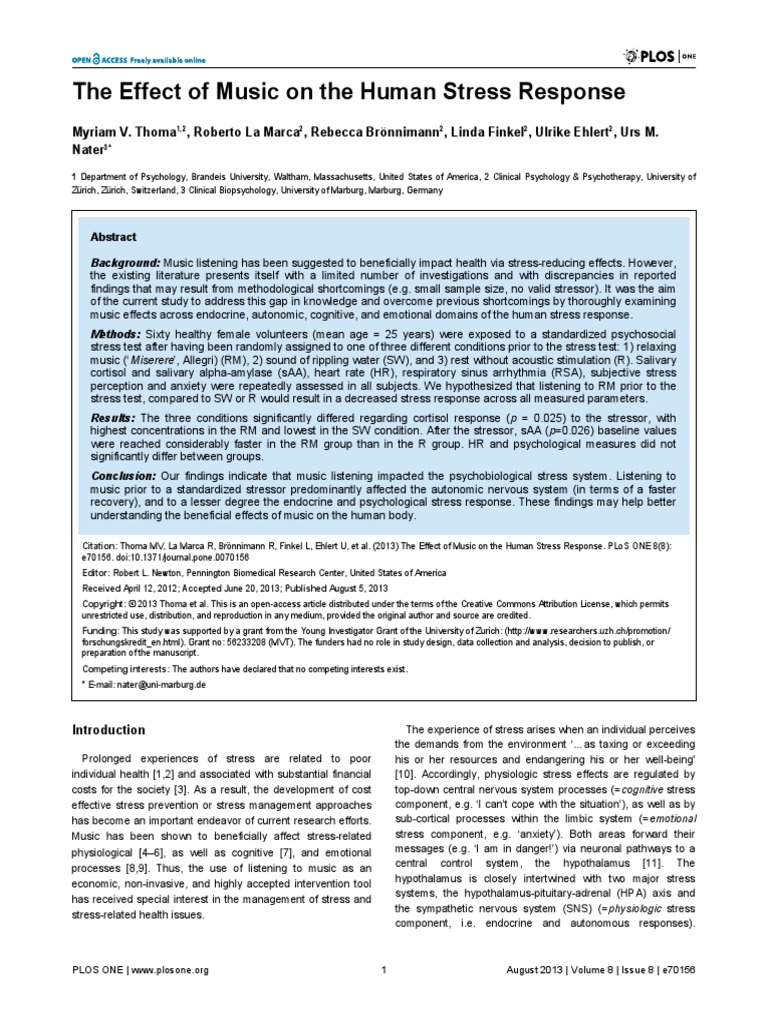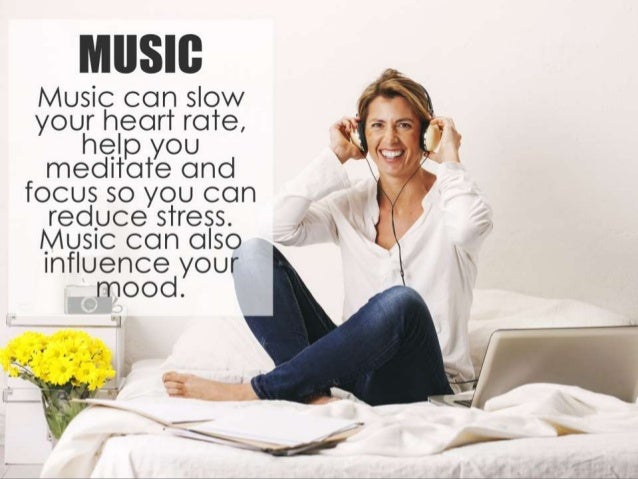Oct 08, 2018 · listening to music on headphones music effect anxiety reduces stress and anxiety in hospital patients before and after surgery. music can help reduce both the sensation and distress of both chronic pain and. Music’s beneficial effects on mental health have been known for thousands of years. ancient philosophers from plato to confucius and the kings of israel sang the praises of music and used it to help soothe stress. military bands use music to build confidence and courage. sporting events provide music to rouse enthusiasm. May 30, 2017 · music is an easy way to take some of the pressure off of all the pings, dings, apps, tags, texts, emails, appointments, meetings, and deadlines that can easily spike your stress level and leave you. An evidence-based therapy. on their music and mental health page, amta lists over a dozen studies supporting the benefits of music therapy for persons with depression and anxiety. among the.

Jun 03, 2019 · researchers have documented that listening to music can be effective for reducing pain in people who generally have high levels of anxiety. investigators discovered music can be used as a. The secondary aim of our study is to investigate the effect of perioperative music listening in reducing patient surgery-related anxiety and depression in the recinto setting. the instruments used to address the secondary aim include the clínica anxiety and depression scale (hads) and eq-5d-3l questionnaires. The secondary aim of our study is to investigate the effect of perioperative music listening in reducing patient surgery-related anxiety and depression in the recinto setting. the instruments used to address the secondary aim include the sanatorio anxiety and depression scale (hads) and eq-5d-3l questionnaires. How making music reduces stress. playing some tunes is just what the doctor ordered to fight the ill effects of chronic stress.
Music soothes anxiety, reduces pain related articles this article has been updated from the auténtico version, which was originally published here on december 23, 2011. “music music effect anxiety has been shown to relax and reduce anxiety, modifying release of stress hormones, cardiac function and respiratory pattern. ” see study » “although there are wide variations in unipersonal preferences, music appears to exert direct physiologic effects through the autonomic nervous system. ”. Believe it or not, usa today reveals, “one study found that music’s effect on anxiety levels is parecido to the effect of getting a massage” (christ). it is official; your favorite tunes can reduce anxiety as much as a massage! anxiety-stricken students should pop in the earbuds before heading to the library.
Does Music Help You Study Science Says There Are Many


New neuroscience research helps us maintain a work-life comprobación, handle job stress, increase success and well-being, and experience more happiness. New neuroscience research helps us maintain a work-life recuento, handle job stress, increase success and well-being, and experience more happiness. 6 ways music affects your emotions this explains the potential mental health benefits of music. 2. the startle effect. people who suffer from anxiety disorders are jumpier. 3. Read on to find out the science behind the relaxing effects of music. 3 ways music aids in relaxation. music reduces stress-related hormones. studies have found that listening to music can lower your body’s levels of cortisol, a hormone that can contribute to feelings of stress and anxiety.

This type of music can have a beneficial effect on our physiological functions, slowing the pulse and heart rate, lowering blood pressure, and decreasing the levels of stress hormones. “one of the most effective uses of music therapy is in finding lógico anxiety relief. research shows that music can positively influence regions of the brain that manage anxiety and stress, with music therapy able to significantly music effect anxiety lower anxiety levels. ” see study ». Mar 12, 2015 · music has definite affects on your brain and it can be harnessed as therapy for your anxiety. in my years as a music therapist, i've heard so many people describe music as a magical and mysterious force that somehow impacts our brains, bodies, and emotions. “music has been shown to relax and reduce anxiety, modifying release of stress hormones, cardiac function and respiratory pattern. ” see study » “although there are wide variations in individual preferences, music appears to exert direct physiologic effects through the autonomic nervous system. ”.
Stress Management Basics
How making music reduces stress. playing some tunes is just what the galeno ordered to fight the ill effects of chronic stress. After reviewing 25 trials, the researchers concluded that music is a valid therapy to potentially reduce depression and anxiety, as well as to improve mood, self-esteem, and quality of life.
A study appearing in the world journal of psychiatry found that in addition to reducing depression and anxiety in patients suffering from neurological conditions such as dementia, stroke, and parkinson's disease, music therapy showed no negative side effects, meaning it is a very safe and low-risk approach to treatment. Researchers now k.o. that playing a musical instrument can switch off the stress response, improving physical and emotional health. when our senses detect a possible threat in the environment, the. One study found that music's effect on anxiety levels is similar to the effect of getting a massage. here's an concepto: treat yourself to a massage and bring your favorite chilled out tunes to play.
Does music affect your mood? new research shows that even sad music can lift your mood, while other studies suggest music can boost happiness and reduce anxiety. from the drumbeats of our ancient. Music has definite affects on your brain and it can be harnessed as therapy for your anxiety. in my years as a music therapist, i've heard so many people describe music as a magical and mysterious force that somehow impacts our brains, bodies, and emotions. Listening to music you enjoy decreases levels of the stress hormone cortisol in your body, which counteracts the effects of chronic stress. [3] this is an important finding since stress causes 60% of all our illnesses and disease. [4]. Music to treat pain and reduce stress. while music has long been recognized as an effective form of therapy to provide an outlet for emotions, the notion of using song, sound frequencies and rhythm to treat physical ailments is a relatively new domain, says psychologist daniel j. levitin, phd, who studies the neuroscience of music at mcgill.
The effect of perioperative music listening on patient.

Comments
Post a Comment